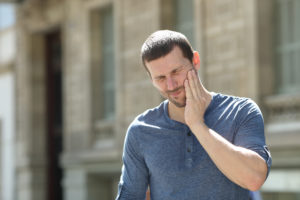
Your temporomandibular joint is the joint that connects your jaw to your skull. When this joint gets damaged, it can lead to an oral disorder commonly referred to as TMJ syndrome. Dr. Soonmyo Wheeler’s extraordinary dental team at Summit Dental has gathered a list of symptoms, signs, and facts to help you navigate any issues you might come across when dealing with this disorder.
Risk factors that play into TMJ syndrome:
- Poor posture in the neck and upper back muscles may lead to neck strain and abnormalities of jaw muscle function.
- Stress may increase muscle tension and jaw clenching.
- Women 18-44 years of age have increased risk.
- Patients with other chronic inflammatory arthritis have increased risk.
- People with jaw trauma or poorly positioned teeth have increased risk.
- People who have a genetic predisposition to pain sensitivity and increased stress responses may be more susceptible.
Symptoms and signs of TMJ syndrome:
- Intense jaw pain,
- Clicking and popping of the jaw
- Ear pain-causing earaches,
- Severe headaches,
- Stiff and sore jaw muscles,
- Pain around the temple area
- Locking of the jaw joint.
Causes of TMJ syndrome:
-
- Misalignment (malocclusion) of or trauma to the teeth or jaw,
- Teeth grinding (bruxism),
- Poor posture,
- Stress or anxiety,
- Arthritis and other inflammatory musculoskeletal disorders,
- Orthodontic braces, and
- Excessive gum chewing.
Things you can do to hinder TMJ syndrome:
- Ice or cold packs to the area of the joint
- Over the counter (OTC) nonsteroidal anti-inflammatory drugs (NSAIDs), such as ibuprofen (Advil, Motrin) or naproxen (Aleve), and other pain relievers, including aspirin (Ecotrin) and acetaminophen (Tylenol)
- Eating soft foods and avoiding chewing gum
- Massage or gentle self-stretching of the jaw and neck muscles (A doctor or physical therapist can recommend appropriate stretches.)
- Relaxation techniques and stress management and reduction
- Some sedative essential oils (such as lavender, chamomile, sweet marjoram, and clary sage) may provide temporary relief from the pain and discomfort of TMJ.
Contact us:
Living and dealing with TMJ syndrome can be real buzz kill when it comes to enjoying your day-to-day life. If you feel you are dealing with this problem and would like more information on this issue, we encourage you to contact our offices located in Rohnert Park, California to schedule an appoint to speak with Dr. Wheeler.
